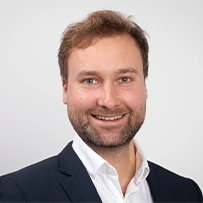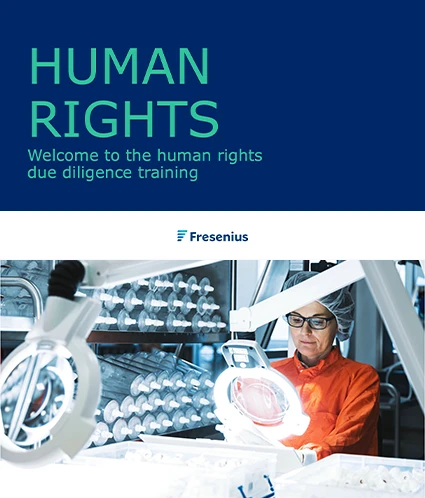Respect for human rights is an integral part of our responsibility as a global healthcare company. As set out in our Human Rights Statement, we acknowledge this responsibility – in our own operations and in our value chain. The following graphic illustrates what this means in practice, showing how people come into contact with our company.
Potential human rights impacts in the value chain
1 – Workforce in the value chain
Anjing and Lisa work on preliminary products that we receive from our suppliers. We then process these products in our own production facilities, for example into medical technology that helps treat people in hospitals. We expect our suppliers to respect the human rights principles laid out in our Human Rights Statement and our Code of Conduct for Business Partners – in both their own activities and in their value chains. This is necessary, as the work of people like Anjing and Lisa, who are employed in our upstream value chain, can give rise to risks or even to violations of human rights. Within the scope of our influence, we are committed to taking appropriate preventive or remedial measures.
2 – Residents and neighbors
Dunya lives with her children next to one of our production sites. Even when she is not working on precursor products or at Fresenius, her human rights must be respected. For instance, Fresenius is responsible for avoiding water and air pollution and excessive noise pollution. This helps ensure the well-being of people like Dunya and her children.
3 – Employees of our business partner
Alejandro works for a logistics company that supports Fresenius in transporting pharmaceuticals and medical technology. As a direct contractual partner, his company is an important part of our value chain. We analyze potential risks for people like Alejandro and initiate additional preventive measures where necessary.
4 – Employees
Chi, Benjamín, Shiva, and Carmen work for Fresenius. Despite their different professions and areas of responsibility, they have one thing in common: As their employer, Fresenius is responsible for respecting their human rights in their working environments. This includes ensuring occupational safety by providing appropriate protective equipment when dealing with patients. It also includes ensuring that people like Chi, Benjamín, Shiva, and Carmen are trained in handling equipment or observe, at a minimum, the statutory break and rest periods.
5 – Patients
For our millions of patients – like Najuk and Valentina – we do our best every day to keep them healthy. Whether in the hospital, at home or as outpatients, they are part of our value chain. While Najuk is treated in the hospital, Valentina receives our medication at home. The well-being of Najuk, Valentina, and all our patients is at the heart of our human rights due diligence.
Our Human Rights Program at a glance
We put our Human Rights Statement into practice through our Group-wide Human Rights Program. This is based on regular risk assessments of our own activities and those of our suppliers. After all, we can only take appropriate preventive and remedial measures if we are aware of the risks. Our Human Rights Program also includes a whistleblower system: Here we receive reports of possible violations and follow them up in detail. We also document our activities and measures and report transparently on our progress.

Lasse Kowalewski
Head of Fresenius Group Human Rights Office
“Our commitment to human rights goes beyond legal compliance and rhetoric. It is closely linked to our values and our promise: Committed to Life.”
Our guidelines
Our Human Rights Program is based on internationally recognized standards and frameworks, including the Universal Declaration of Human Rights, the Core Labor Standards of the International Labour Organization, the UN Guiding Principles on Business and Human Rights (UNGPs), and the OECD Due Diligence Guidance for Responsible Business Conduct.
Pivotal point: Carefully analyzing potential impacts and risks
To identify and eliminate potentially adverse effects on people in our own company and along our value chain, we carry out an annual risk analysis – and more frequently where necessary. We identify, analyze, and evaluate human rights related risks in a comprehensive process. Our approach consists of three steps:
Review of country- and sector-specific risks
We carefully analyze relevant public sources and indices. In this way, we gain an overview of abstract human rights risks – i.e. risks for which no specific incidents are yet known, but which may indicate human rights violations.
Gap identification and risk specification
We carry out a gap analysis to assess which of the identified potential risks may actually exist. For example, we use standardized questionnaires to capture processes, responsibilities, and procedures for each potential risk area.
Risk evaluation
We assess the potential impact on affected people and estimate the likelihood of occurrence. We prioritize the relevant risk areas according to their severity, taking into account our ability to influence them. We then define remedial and preventive measures for the prioritized risks.
Anonymous contact available 24/7
Patients, employees, members of local communities, business partners, and other potentially affected persons can report potential human rights violations via various channels – around the clock, and anonymously if they wish. Specially trained teams process the reports professionally, independently and impartially, carefully and confidentially. You can find out more about our complaint handling mechanism in the section Compliance: Doing the right thing.
We have high expectations – of ourselves and of our business partners
We set high standards for ourselves – and expect the same from everyone we work with. Accordingly, we require our business partners to respect human rights in line with our principles. These are set out in our Human Rights Statement and in our Codes of Conduct. If we learn of a potential human rights violation, we carefully examine the facts and take appropriate action. In the event of an actual violation, we work to ensure that the business partner concerned takes remedial action and does everything necessary to prevent future violations.
Joint commitment to higher standards in supply chains
Fresenius Kabi is an associate member of the Pharmaceutical Supply Chain Initiative (PSCI), an association of leading pharmaceutical and healthcare companies that aims to promote responsible supply chain management. The PSCI’s principles set clear standards and guidelines regarding ethics, labor rights, health and safety, environmental sustainability, and supplier management systems.

First global training course on human rights due diligence
What are human rights? How can I report a possible violation? And what does the term human rights due diligence mean?
Our employees and business partners need to know the answers to these questions if we are to put our commitment to human rights into practice. For this reason, we have developed a global human rights training course – together with colleagues from different parts of our organization. The topics have been prepared to reflect the day-to-day business and cultural aspects of our locations around the world.
This training is mandatory for all our employees. It will also serve as a supporting measure in our collaboration with our suppliers as of 2025. Suppliers will be selected based on their respective risk profile. In this way, we want to actively contribute to the further development of our corporate culture and create a common understanding of due diligence obligations in our value chain.

